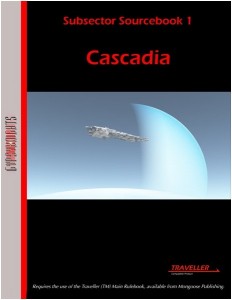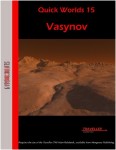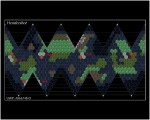Quick Worlds
Quick Worlds is a series of supplements for Traveller and published by Gypsy Knights Games.
By John Watts

Welcome to the twenty-fifth Designer’s Diary, a regular column where designers are given the opportunity to take readers on an in-depth ride through the design and development process of their system, setting, or product. If you’d like to share your product in the Designer’s Diary column, send a message to aaron@roleplayerschronicle.com.
Designer’s Description
The Quick Worlds series is a set of individual worlds meant to be used with the Traveller role-playing game available from Mongoose Publishing. There are currently 15 worlds in the series. The first 12 (plus an additional 8 not available anywhere else) are also compiled in the Cascadia subsector sourcebook. The Quick Worlds are available in PDF format. The Cascadia subsector sourcebook is available in PDF format and in print with both hard and soft cover options. All are available at Drive-Thru RPG and RPGNow.
Purpose
Each of these worlds is meant to be the backdrop for an evening (or several evenings) of adventure using the Traveller rules set. To me, Traveller is about traveling. It is, through your characters, vicariously visiting new worlds and experiencing their cultures along with an exciting adventure to accompany that travel experience.

For a lot of Referees (the Traveller parlance for gamemaster), it is sometimes difficult to create a world for the next adventure. There are many reasons for this. I know many Referees are more interested in creating other aspects of the game and thus world creation can go on the back burner. For some, the Referee is simply too busy with the outside world to create both a solar system for travel and an interesting adventure. Of course, there is also the other problem in that players don’t always go where you’d like them to go and it is handy for a Referee to have a back-up plan.
It is for all of these reasons that we created the Quick Worlds series. Simply put, the Referee can have a new world in front of him/her quickly (hence the name). Pressed for time because you are working two jobs to make ends meet and you’re running a Traveller game this weekend? Not interested in world creation? Characters decide they don’t want to go to the world you spent four hours tweaking? It’s not a problem. Grab one of the Quick Worlds and you’re good to go.
Influences
Over the years, I’ve been influenced by a great many books, films, and TV shows. Star Wars, Star Trek and the Heinlein youth novels formed the basis of my childhood. As I grew up, I became highly influenced by H. Beam Piper, Heinlein’s adult novels, Poul Anderson, Larry Niven, Jerry Pournelle, Blake’s 7, and Hal Clement. Clement’s works and talks at conventions concerning world creation were a huge influence on my work and I’m pleased to say that I met him on several occasions before his passing in 2003. More current influences on the Quick Worlds series include Firefly and the novels of Allen Steele.
One of the chief influences on the series was my own experiences with Traveller. I discovered Traveller in 1985 and fell in love with the game. I had been running Traveller for 26 years and many of my players have been playing in these games for the majority of that time period. Most any of the official printed worlds had long been visited by my characters and we had moved into discarding much of the official Traveller universe and creating our own.
As I was running a weekly or bi-weekly Traveller game, this often meant that I was required to present a new world almost every week. During the last few years, I was running a weekly Traveller game, working 65 hours a week at an electrical supply company during the housing boom in the Southeast US, and working as a stadium announcer for a successful minor league football team, the Chattanooga Steam. Most often one would find me at my desk at home busily preparing an adventure and a world in which that adventure might take place for the next game. Sometimes on the Friday night before I was expected to run a game on Saturday night.
After the housing boom slowed and I was working far less (and was laid off for a time), it occurred to me that I couldn’t possibly be the only Traveller Referee facing this predicament. Hopefully, the Quick Worlds are meeting this challenge.
Research
Each of the Quick Worlds series requires a bit of research. Sometimes it requires studying real life cultures (such as with the worlds of Kyiv and Catalunya). In the setting we at Gypsy Knights Games are building, we postulate that many cultures from Earth spread out into the stars and then, over time, evolved into separate cultures. However, for some of the worlds, the originating culture still holds enormous meaning for these new worlds. We hope to reflect that in those worlds.
With some of the worlds, we research ideas for different cultural and governmental solutions. Some of them have been tried in the past and failed. Some of them have simply been postulated and never tried.
In addition, we study things like geology, geography, climate, tectonic movements, and astronomy to aid in the creation of these worlds. While none of us are physicists, astronomers, or geologists, we do hope to create a believable background for a Traveller Referee to use as a backdrop for his/her adventures.

Art Direction
We use a variety of artists throughout the series for our covers, utilizing the talents of amazing artists (such as Ian Stead). We try to keep a certain ambiance of what we consider to be the quintessential aspects of Traveller: adventure, mystery, and excitement.
For the interiors, we try to show the essentials of the planetary system in which the characters will travel. We include a system map showing the main inhabited planet and its relationship with the other worlds in the system. We also include an icosahedron planetary map, which is a Traveller staple. Each of these is intended to be able to give a Referee an easy handout to the characters so they can readily understand their location.
Gaming Experience
Our hope is that we are providing a background for a great many different styles of adventuring. Each main planet in the Quick Worlds series comes along with a varied set of adventure hooks. Each of these is intended to “spark” the imagination of a Referee who might not have a pre-planned adventure for use with this world. Or if his/her gaming group strays from the intended path, he/she can easily switch to an adventure based on one of the provided hooks.
We try to make sure that there are several different hooks for different types of characters. If you are running a game with a group of rich dilettantes, we want you to be able to use the product just as easily as if you are running a game with a mercenary company or a merchant ship.
In addition, we try to make sure that each world has its own unique personality. And while two worlds might be physically similar, the people, government, legal system, and culture may be quite different. We try to make sure that each new world will be somewhere that your players will remember vividly.
Development Process
Each of the Quick Worlds has its own design process. Some of them were designed for Traveller games years in the past while others are the product of more recent inspiration. All of them, however, will have seen play at some point within the Gypsy Knights gaming group.
Many of the worlds start with a simple idea. For instance, Chance, the gambling planet, started out with an idea from one of our group, Greg Seaborn. Greg’s idea was to have a world that was positioned in such a way as to be an important “bridge” between world clusters. In addition, such a location would be a natural location for a world dedicated to gambling and other entertainment. It was then decided that such a concept would not need a “garden” planet, but could be set on a barren world. Indeed, what do you do with an airless rock orbiting a red star? You build a casino!
We then fleshed out the idea of a one-city planet with several casinos, casino owners, companies, and mob bosses. We came up with several interesting and unique casinos that would provide a fun experience for characters. We drew inspiration from a number of places, both real and imagined. One of the casinos, 555 Russell, was actually based on a number of things that happened in and around the dorm in which I lived during my time at the University of Georgia.
After fleshing it out and drawing up the statistics, we then mapped out the planet and solar system. For Chance, this was somewhat easy as Chance is the only planet in the system. However, for some systems, such as the binary system of Monroe, this is much more complex.
While some of the worlds grow from concepts like that, some are more personal. Three of the Quick Worlds (Gagnon, Hendershot, and Campbell) are tributes to members of our gaming group who have passed away over the years. Most recent was the passing of our good friend Vincent Campbell. Vince passed away from a brain aneurysm and we crafted the world Campbell in his honor. All proceeds from the sale of Quick Worlds 10: Campbell go directly to the Brain Aneurysm Foundation.
In the end, our intention is to build a set of useful and interesting products for Traveller Referees. Hopefully, we are taking some of the workload off the Referee and providing the spark in his/her imagination that can provide entertainment for the players in his/her group.

